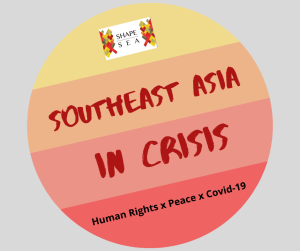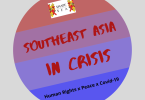Justin Francis Bionat
Graduate of the APMA programme 2018 Cohort , MA Human Rights and Democratisation, of the Institute of Human Rights and Peace Studies, Mahidol University. He has been working on youth, sexual and reproductive health and rights (SRHR), and LGBTIQ advocacies.
 Covid-19 highlights the need for a paradigm shift that does not distinguish the “us†and “themâ€, the “affluent†and “poorâ€, and the “developed†and “underdevelopedâ€. A nexus between global health and human rights has to be established. The current global health situation caused by CoVid-19 calls for all to take a rights-based approach.Development and human rights scholars have suggested a paradigm shift necessary in matters of global health focusing on justice and pragmatic solidarity (Gostin and Dhai, 2014; Farmer and Gastineau, 2009). The right to health should be the basis of all states’ commitments in ensuring the well-being of everybody (citizen or non-citizen.)Disparities in accessing healthcare reflect a burden of disease shouldered by states that have little capacity to provide tenable solutions. Global health justice entails shared responsibility between the global south and the global north (Gostin and Dhai, 2014) and collaborative solutions between nations (West-Oram and Buyx 2016).Pragmatic solidarity (Farmer and Gastineau, 2009) encourages the rapid deployment of tools and resources to improve the health and well-being of affected populations. It is recognized that human rights abuses in health stem from structural violence affecting different populations. These health injustices originate from a weak health system violating key aspects to the right to health, being an inclusive, non-discriminatory right (OHCHR & WHO.)With respect to justice, the concept of global health brings to the fore the importance of country contexts and concerns that national security should not upend the state’s commitment to protecting human rights. However, the reality of global health is that the success of local and regional health responses is reliant on a larger movement of global health justice (West-Oram & Buyx, 2016).Global health responds to epidemics like Ebola, Tuberculosis, and HIV, which had spread easily due to globalization, including migration, conflict and displacement, decolonization, and industrialization. Covid-19, as it seems, is no different—posing threats to both national and human securities.This new proposed agenda places the provision of services at the core while advocating for societal transformation in the prioritization of health and rights by governments. Pragmatic solidarity begins by finding shared solutions to address key development issues (i.e. the strengthening of health infrastructures and systems of care) as it attains global health justice.The pragmatic solidarity is observable in the “ASEAN Post-2015 Health Development Agenda†developed by the ASEAN health ministers meeting (AHMM). These health strategic measures maximises health system potentials of the ASEAN member states. ASEAN would be instrumental to this proposed paradigm when it actively contributes to strengthen collaborations on global health with other countries and development partners, especially with the current CoVid-19 pandemic. In addition, the ASEAN health sector has also bolstered its response to CoVid-19 anchored on a Joint Statement during the ASEAN plus three health ministers meeting in 2019. This response is hinged on ASEAN member states sharing timely information and technical knowledge.The ongoing Covid-19 pandemic reminds us that marginalization and vulnerability increases during pandemics because systems are disrupted. Therefore, the marriage of global health justice and pragmatic solidarity is essential. The immediate solutions can be seen when governments are responsive to immediate testing, treatment, care and support for those afflicted by CoVid-19. Medium term solutions can enable policy changes that improve failed health approaches and prepare for yet another health emergency. The longer term solutions would include increase in healthcare financing, creation of sustainability measures, and research for scale-up.The shared responsibility to global health exercised by states will achieve this paradigm shift centered on pragmatic solidarity and vital to the realization of health human rights. Only then pandemics like Covid-19 can be treated and prevented in the future.References:
Covid-19 highlights the need for a paradigm shift that does not distinguish the “us†and “themâ€, the “affluent†and “poorâ€, and the “developed†and “underdevelopedâ€. A nexus between global health and human rights has to be established. The current global health situation caused by CoVid-19 calls for all to take a rights-based approach.Development and human rights scholars have suggested a paradigm shift necessary in matters of global health focusing on justice and pragmatic solidarity (Gostin and Dhai, 2014; Farmer and Gastineau, 2009). The right to health should be the basis of all states’ commitments in ensuring the well-being of everybody (citizen or non-citizen.)Disparities in accessing healthcare reflect a burden of disease shouldered by states that have little capacity to provide tenable solutions. Global health justice entails shared responsibility between the global south and the global north (Gostin and Dhai, 2014) and collaborative solutions between nations (West-Oram and Buyx 2016).Pragmatic solidarity (Farmer and Gastineau, 2009) encourages the rapid deployment of tools and resources to improve the health and well-being of affected populations. It is recognized that human rights abuses in health stem from structural violence affecting different populations. These health injustices originate from a weak health system violating key aspects to the right to health, being an inclusive, non-discriminatory right (OHCHR & WHO.)With respect to justice, the concept of global health brings to the fore the importance of country contexts and concerns that national security should not upend the state’s commitment to protecting human rights. However, the reality of global health is that the success of local and regional health responses is reliant on a larger movement of global health justice (West-Oram & Buyx, 2016).Global health responds to epidemics like Ebola, Tuberculosis, and HIV, which had spread easily due to globalization, including migration, conflict and displacement, decolonization, and industrialization. Covid-19, as it seems, is no different—posing threats to both national and human securities.This new proposed agenda places the provision of services at the core while advocating for societal transformation in the prioritization of health and rights by governments. Pragmatic solidarity begins by finding shared solutions to address key development issues (i.e. the strengthening of health infrastructures and systems of care) as it attains global health justice.The pragmatic solidarity is observable in the “ASEAN Post-2015 Health Development Agenda†developed by the ASEAN health ministers meeting (AHMM). These health strategic measures maximises health system potentials of the ASEAN member states. ASEAN would be instrumental to this proposed paradigm when it actively contributes to strengthen collaborations on global health with other countries and development partners, especially with the current CoVid-19 pandemic. In addition, the ASEAN health sector has also bolstered its response to CoVid-19 anchored on a Joint Statement during the ASEAN plus three health ministers meeting in 2019. This response is hinged on ASEAN member states sharing timely information and technical knowledge.The ongoing Covid-19 pandemic reminds us that marginalization and vulnerability increases during pandemics because systems are disrupted. Therefore, the marriage of global health justice and pragmatic solidarity is essential. The immediate solutions can be seen when governments are responsive to immediate testing, treatment, care and support for those afflicted by CoVid-19. Medium term solutions can enable policy changes that improve failed health approaches and prepare for yet another health emergency. The longer term solutions would include increase in healthcare financing, creation of sustainability measures, and research for scale-up.The shared responsibility to global health exercised by states will achieve this paradigm shift centered on pragmatic solidarity and vital to the realization of health human rights. Only then pandemics like Covid-19 can be treated and prevented in the future.References:
- ASEAN Post-2015 Health Development Agenda, endorsed by the ten ASEAN member states. Available here: https://asean.org/wp-content/uploads/2017/02/APHDA-In-a-Nutshell.pdf
- Ministers of Health of ASEAN Member States (AMS), “Joint Statement of the 8th ASEAN-Plus Three Health Ministers Meeting, 2019 Siem Reap, Cambodia. Available here: https://asean.org/storage/2019/09/8th-APTHMM_Joint-Statement_FINAL1.pdf
- Farmer, P., and Gastineau, N., 2009. Rethinking Health and Human Rights: Time for a Paradigm Shift. In: Goodale, M., ed. 2009. Human Rights: An Anthropological Reader. Blackwell Publishing. West Sussex, United Kingdom.
- Gostin, L.O., and Dhai, A., 2014. Global Health Justice: A Perspective from the Global South on a Framework Convention on Global Health. In: Teays, W., Gordon, J.S., and Renteln, A.D., ed., 2014. Global Bioethics and Human Rights Contemporary Issues. Rowman & Littlefield. Maryland, United States of America. pp.319-328.
- Lock, M. and Nguyen, V.K., 2018. An Anthropology of Biomedicine. 2nd John Wiley & Sons, Inc. New Jersey, USA.
- OHCHR and WHO, “The Right to Healthâ€. Fact Sheet No. 31. Available here: https://www.ohchr.org/Documents/Publications/Factsheet31.pdf
- West-Oram, P. G. N., & Buyx, A. (2016). Global Health Solidarity. Public Health Ethics, phw021.doi:10.1093/phe/phw021





